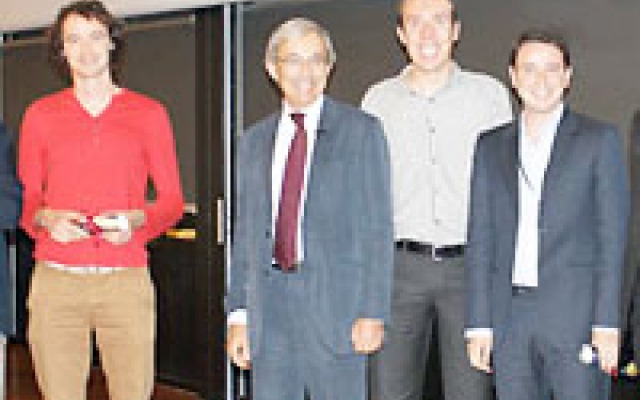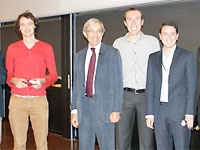community
PhD student Jan Grobovsek (IDEA) receives FEEM Award at 2011 EEA Congress

Jan Grobovsek, an advanced student of the UAB's International Doctorate in Economic Analysis (IDEA), one of the BSE's reference doctoral programs, received a 2011 FEEM Award at the 26th European Economic Association (EEA) Congress at the University of Oslo in Norway. The award goes to the best three papers by young economists over the course of the five-day EEA Congress. Mr. Grobovsek's paper, "Development Accounting with Intermediate Goods," was chosen from more than 600 eligible papers on the 2011 program.
Rewarding new ideas on key economic issues
The Fondazione Eni Enrico Mattei (FEEM) began presenting the FEEM Award at the 2009 EEA Congress, hosted by the BSE. The award replaces the Young Economist Award and aims to reward new ideas addressing key economic issues at the European and global scale. Eligible candidates should be less than thirty years of age and no more than three years past a PhD defense.
The 2011 FEEM Awards were presented in Oslo before the membership of the EEA and its President, Nobel Laureate Prof. Christopher Pissarides (London School of Economics). The selection process was conducted by the FEEM Award Commission: Prof. Alessandro Lanza (Eni Corporate University and FEEM), Prof. Espen Moen (Norwegian Business School and EEA Congress Program Chair), and Prof. Hélène Rey (London Business School).
In good company
With this award, Mr. Grobovsek joins the company of other BSE community members who have won the Young Economist Award in previous years, including:
- 2007: Prof. Paula Bustos (CREI and GSE)
- 2004: Prof. Pablo Casas-Arce (UPF and GSE)
- 2004: Prof. Gino Gancia (CREI and GSE)
Motivation Letter: "Development Accounting with Intermediate Goods"
The importance of productivity differences across countries have been scrutinised in several papers. Using a multi sector growth model the paper proposed by Jan Grobovsek shows that inefficient intermediate production strongly depresses aggregate productivity and increases the price ratio of final goods to services. A model for middle and high income countries has been also developed reaching the conclusion that poorer countries are only modestly less efficient at producing goods than services, but substantially less efficient at producing intermediate goods relative to final goods and services. If all countries had the intermediate production efficiency of the US, the aggregate productivity gap between the lowest and highest income countries in the sample is predicted to reduce by roughly two thirds while cross-country differences in the final price ratio would virtually vanish. Both the theory part and the empirical part of this paper give new insights and new ideas. It would be possible that the paper is likely to encourage further research.

Presentation of 2011 FEEM Awards at the EEA Congress in Oslo, Norway. Jan Grobovsek (IDEA), left, with EEA President and Nobel Laureate, Prof. Christopher Pissarides, and the other FEEM Award recipients.
Download winning paper [pdf]:
"Development Accounting with Intermediate Goods"
by Jan Grobovsek (IDEA)
